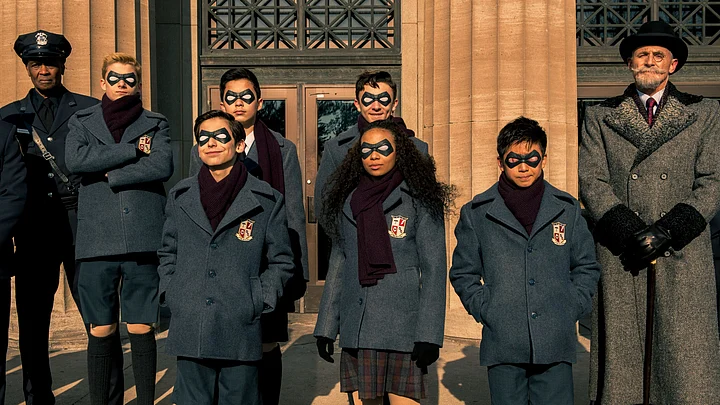I have a rather odd history with The Umbrella Academy. When it was announced, I had no interest in the show because it seemed like yet another superhero story in an already saturated market. Then when I saw the trailer, I was on medication for an injury which made the trailer seem like a blur of superhero clichés and soap opera style drama. The fact that the Marvel shows were being pulled from Netflix and this being a possible replacement didn’t seem to instil any excitement.
So, when I ultimately fired up the show, I was quite frankly blown away by the pilot episode. The Umbrella Academy is not just a tame replacement to the Marvel shows but a dazzlingly entertaining, thoughtful and often funny exercise in superhero genre tropes.
Whatever clichés it contains, it makes up for in terrific performances, kinetic action sequences and eye popping CGI. It’s another first class piece of binge worthy material from Netflix, proving yet again that no one other than them commands the magic touch of getting its viewers absolutely addicted.
The show is based on a comic series of the same name, and the key to the effectiveness of the show is the characters and their arcs. We’re introduced to an X Men-like situation where a rich old man takes in a bunch of young folks with special powers in his mansion, and trains them to hone their skills to do good. There are seven kids in total, but they’re numbered and not named, and together they are an Avengers-like team. But, that’s not what the show is about – this is not an origin story; what makes this special is the treatment of this Avengers like setup – and the less you know the better. The show beautifully inserts drips of information during the first two episodes to reveal information about the universe it is set in, and each piece of discovery is a gotcha moment perfectly wrapped in a crowd pleasing tone.
So, go in completely blind, but also don’t assume that the revelations end on episode two – the twists keep coming in subsequent episodes, and the show does get darker than you expect it to, which is a good or a bad thing depending on how dark you want your escapist entertainment to be.
I’d say the first five episodes are the best, bounciest thing Netflix has put out so far this year, and once we’re past the halfway mark things become a bit too sombre for the show’s own good. Until then, the showrunners inject clever use of the various super powers; there are a lot of funny sight gags, but the best laughs are character-driven thanks to the banter and interplay between the characters. The dynamic between Number Four (Robert Sheehan) and Number Two (David Castaneda) is the most fun, but the former has some good moments with pretty much everyone else, ultimately becoming the most memorable character in the show.
There are a few slumps of chattiness that at times feel like overlong pauses in pace of the story, but the showrunners still manage to nurture a sweet spot between goofy and grim, crystallized mainly by Number Five (Aidan Gallagher) who renders a wonderful metaphorical take on man-children.
The 15-year-old Gallagher’s performance is so good he even eclipses Ellen Page who gets top billing as Number Seven, but who seems unable to mask the clichés of her character and emotional arc.
The rest of the characters are all mired in a Greek tragedy of sorts, which works on most levels, and the complexity of their stories and its many facets makes the show worth binging through. There are realistic consequences for the characters mixed in with the superhero comic book-ness and that helps create a foundation with high enough stakes for you to care about.
The story has a cautionary tale aspect, of course, but luckily things don’t get too heavy-handed. It’s all draped in some truly excellent retro style artwork. The titular mansion is beautifully designed as are some of the side characters that dwell in it, particularly Pogo – an ape who speaks with a British accent, the Alfred of sorts of this show.
On the downside The Umbrella Academy does harbour the standard issue superhero cliché of the nasty but tragic villain who pretends to be the good guy at first but then takes off his mask to reveal his masterplan to do evil things. Even though you would be able to see the unmasking from a mile away, it still works in the show because the showrunners don’t go overboard in hiding the villain’s identity.
The only two issues with the villain is that their back story is exactly the same as a villain from a superhero movie in the 2000’s, and that they exit the story before there are any redeeming qualities to be found. It makes the character under-utilised and whatever happens to said character sends a confusing message to very young audience members watching the show. The show also ends on a cliff hanger, further adding to the unsatisfactory nature of the villain’s culmination, and also leaving you with the annoying feeling of some questions not being answered, but that’s Netflix’s strategy of making you crave for season 2.
But there's no way around it – if you're a fan of superhero stories The Umbrella Academy is a solid recco. There’s suspense, action, mystery, comedy - you get everything you know and love about the genre but you do get it in a mouth-wateringly beautiful presentation bookended by a fantastic soundtrack. The best way to watch it is on a giant 4K TV, but even on a tablet or laptop it would be difficult to take a break from the binge.
(At The Quint, we question everything. Play an active role in shaping our journalism by becoming a member today.)
